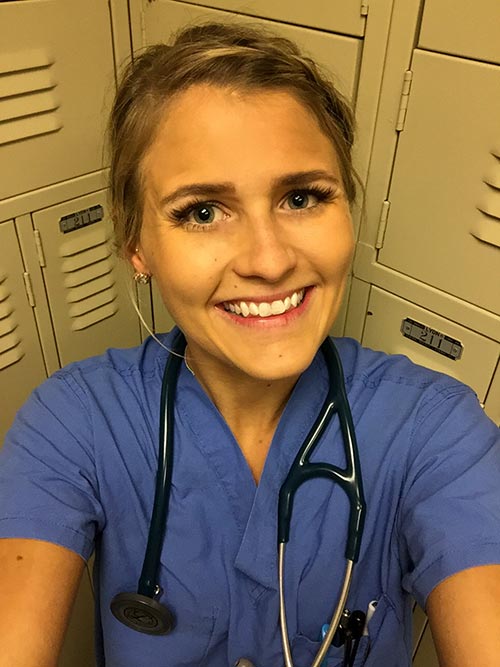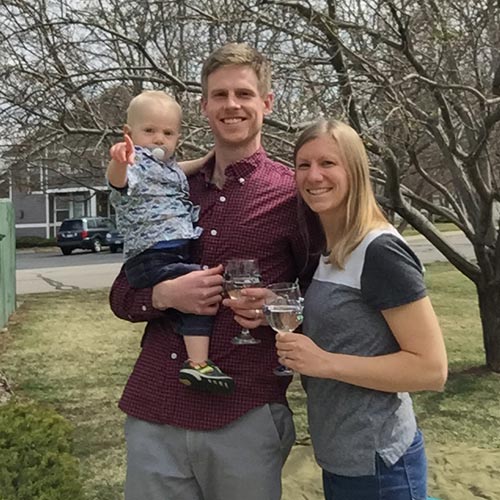CSB/SJU nursing graduates working to combat COVID-19 pandemic
April 21, 2020
By Frank Rajkowski

Hannah Jacobs Sauer ’15 is ready for another shift at the hospital.

Kelley Knapek Buysse ’12 with her family during some down time in Colorado.
Under normal circumstances, Hannah Jacobs Sauer ’15 generally knew where she’d be working each day when she reported to start her shift as a nurse at Providence St. Vincent Hospital in Portland, Oregon.
But the past couple of months have been anything but normal circumstances.
And in the midst of the ongoing COVID-19 pandemic, Sauer – like so many graduates of the nursing program at the College of Saint Benedict and Saint John’s University – has found herself on the front lines of the battle to combat this virulent virus.
“I’m usually in the cardiac intensive care unit,” Sauer said. “But right now, every day is different. I can be anywhere between the Cardiac ICU, the regular ICU and the COVID ICU. I just don’t know until I get to work that day where I’m going to be needed most.”
It is in the COVID ICU where Sauer has witnessed first-hand the devastating impact the virus can inflict on those who contract it.
“From a respiratory standpoint, these patients are the sickest I’ve ever cared for,” she said. “And they’re not all getting better. They’re not all old either. I initially thought most of the patients I’d be seeing would be in their 60s or 70s. But we’re seeing a lot of people in their 40s and 50s. And they don’t all have other comorbidity factors that you would expect might put them at risk.”
The story has much the same for Kelley Knapek Buysse ‘12, an Infection Prevention Specialist at Good Samaritan Medical Center in Lafayette, Colorado – located around 18 miles from Denver.
“Once we started to see sustained spread of the virus in the United States, my primary focus at work became COVID,” she said via email.
“At this time, my day starts with reviewing our patient census to see how many patients we have in-house with suspected and confirmed COVID, and making sure these patients all have the right isolation protocols in place. Then, our hospital leadership team has our morning briefing to review what happened overnight, the current status of our hospital and the goals for the day.
“My projects each day change depending on what we're facing at the time. This usually means extensive work with our Materiel Management department regarding personal protective equipment (PPE) use and/or conservation.
“I also work with teams throughout the hospital on various topics such as planning for a surge of patients, management of COVID patients undergoing surgical procedures or other treatments, determining what to do regarding visitors, etc. I am responsible for coordinating with the local health department to report positive COVID test results and helping with contact tracing.
“I round on the units throughout the hospital to speak with nurses, physicians, respiratory therapists, environmental services workers or anyone else I run into. I use these rounds to identify some of the challenges that staff are running into, ask for ideas on how to manage things better and provide education to our staff. “
That’s already a long and stressful shift, but Knapek said it doesn’t always stop there.
“My day doesn't always end when I get home,” she wrote. “Once I put my son to bed, I may try to answer emails and finish up projects. I’m also on call overnight, although now that we have more protocols in place, the calls in the middle of the night have thankfully decreased.”
Rachelle Larsen, professor and chair of the nursing department at CSB/SJU, says hearing what graduates like Sauer, Knapek and many others are facing as they care for patients during this pandemic is emotional.
“It’s hard knowing our grads are out there on the front lines,” she said, her voice cracking. “It’s so challenging and my heart goes out to them. I worry for all of them. But I know our students, and so many others, will rise to the challenge.”
Even those who work in locations that have not yet been hit as hard by the virus’s spread have felt the impact.
Luke Schumacher ’07 works as a certified registered nurse anesthetist in Grand Rapids, Minnesota. And he said the way he goes about his duties has changed as a result of the pandemic.
He is part of a group of six CRNAs in the area, and they have now divided into groups of three – each working two weeks on and two weeks off.
“The idea is to limit our exposure to the hospitals and patients as much as possible so that we have people who are healthy and available,” said Schumacher, a starting offensive lineman on the 2003 SJU football team that won a Division III national title.
“So far it hasn’t hit us that hard in Itasca County. We only have two confirmed cases so far (as of April 20). But those numbers are skewed – not just here, but in the state – because for the most part we’re only testing people in hospitals and health care workers. We’re not testing out in the community, so there could be many more people who have been exposed and we just don’t know that yet. We’re watching what’s going on elsewhere and making sure we stay ready and prepared.”
Schumacher said being there to help people in times of need is what drew him to nursing in the first place.
“I went into the nursing field to help people,” he said. “My Mom was a nurse and she made a lot of sacrifices over the years to be there when people needed her most. I used to watch when she’d be called in during the middle of the night. That drove me to get into this field too.
“I’ve always been someone who wants to help people. And this is a time when help is needed. So I haven’t regretted getting into this field one bit as a result of this pandemic.”
Like many health care workers who have been dealing with the challenges posed by COVID-19, Sauer and Knapek said the isolation required to protect the spread of such a contagious virus can be draining, both emotionally and physically.
“A really challenging moment for me was when we had to come up with a plan for when patients are actively dying,” Knapek said. “As a nurse, I know that death is a part of life and that having family present when someone makes that transition is important.
“When a person is dying of COVID, however, I have a responsibility to prevent the spread of this infection to other individuals. This may mean limiting contact between the dying individual and uninfected family members, as well as limiting contact between potentially infected family members and other visitors or staff at the hospital.
“We had to get creative with technology and work closely with our chaplains on this. It was hard to find a balance between allowing families to have the goodbye that they want, while also containing the virus to prevent other families from being in the same position in the future.”
And because contact has to be limited even among those providing care, nurses in COVID units are performing many tasks they might not usually take on.
“We’re doing every aspect of care now because we have to limit the number of people who can go in there,” Sauer said. “We’re doing our own blood draws, we’re helping with physical therapy. We are running our blood work down to the lab because we are not using the pneumatic tube system in an effort to reduce the spread of the virus through the hospital.
“I think yesterday I put in seven-and-a-half miles on my feet over the course of my shift.”
While going about their duties, Sauer and Knapek said they have been able to draw on some of the things they recall being stressed during their time in the nursing program at CSB/SJU.
“The nursing program at CSB had a saying: ‘Listen with the ear of your heart,’ ” Knapek said. “While we may have made a few jokes about that while in school, I have incorporated this in everything that I am doing.
“I work with a lot of different people, both within the hospital and in the larger community in my role. There is a lot of fear around COVID and this is a stressful time for everyone involved. Listening with the ear of my heart has allowed me to acknowledge and address the fears of those around me as we work through this time together.”
“Something I always think back on is how much we talked about the holistic approach,” Sauer added. “It’s not just about medicine or anatomy. It’s about treating the person as a whole. At CSB and SJU, they really emphasize that and it’s a big part of the values I’ve always had myself.
“That’s something I’ve really been able to draw on now as I’ve found myself in the middle of all this.”
Both Sauer and Knapek strongly stressed the need for everyone to pay attention to the guidelines that local and national health officials have put in place. They said that will be a critical component of bringing and keeping the pandemic under control.
“It takes everyone working together to get through something like this,” Knapek said. “Listen to the advice from your public health departments: stay home, wash your hands, cover your cough. Now, more than ever, we need community so reach out to those around you in a safe manner. We will never be the same after this, but I don't think that's a bad thing.”
“It’s better to play it safe and stay home,” Sauer added. “If you want to go out and get some fresh air, or go for a walk, that’s great. But try to limit your trips to the store. Don’t go there for things you want, just for things you need.
“If people pay attention to the guidelines that have put in place where they’re living, that will go a long way.”
